What you will learn
- Which books Mark & Gael love (and which books have shaped their personalities and careers the most)
- Why Mark & Gael actually read books outside of Internet Marketing
- The one book Gael thinks everyone should read
- Why Gael & Mark think continuously gaining knowledge is one of the most valuable things you can do
- How we optimised the process over time
We’re avid readers here at Authority Hacker. And, honestly, that might just be a trait of all good marketers; we tend to have an absolute addiction to knowledge.
In the words of the infamous Conor Megregor, “I’m #1 in my craft, but I come to the gym every day as a white belt.” In other words, improvement is a continuous endeavor.
For us, of course, that means reading books about business. That’s what we do, and it’s what we’re passionate about. But it also means improving as people and citizens of the world.
So, on this podcast (and in the list of books below), you won’t only find books on business. You’ll find books on everything. You’ll see and hear about books on everything from economics to wealth building to nutrition.
These are simply the books that have made the biggest impact for us personally.
Reading List: Book Recommendations from Gael & Mark
Adventure Capitalist by Jim Rodgers
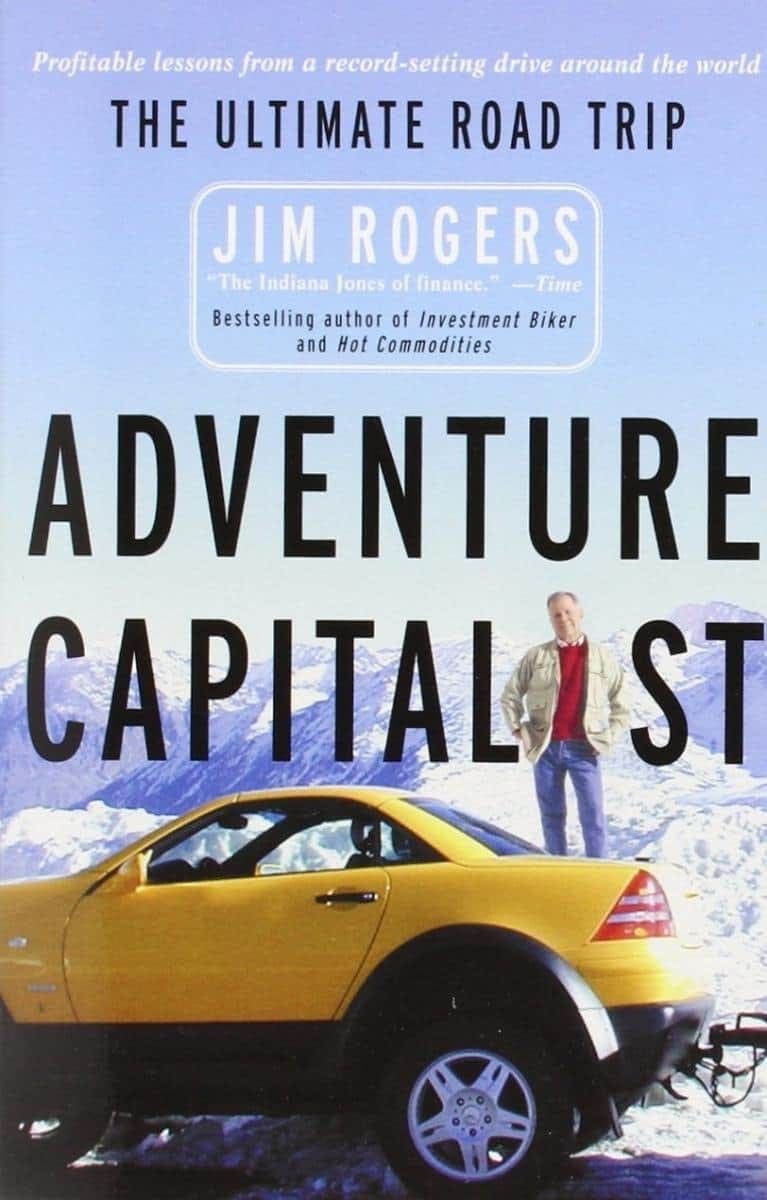
Jim Rodgers is the bestselling author of Investment Biker, a business-adventure hybrid tale that spans 52 countries over 22 months. In The Adventure Capitalist, Jim travels the world to investigate how things really work in two epic round-the-world trips.
By investigating the world “mile by mile,” Jim extrapolates a bunch of awesome conclusions about business, economics, and global politics. Here are just a few of the conclusions he comes to…
China will dominate the 21st century. The Euro, as a currency, is on its way to complete failure. Angola represents tremendous business opportunity. NGOs (nongovernmental organizations) are farces headed by charlatans. And (obviously) a lot more.
It’s a meandering book of observation-based opinions of a guy who’s basically seen and done it all. Pretty rad, and, if nothing else, a cool way to see how a person with this much experience and insight views the world at its most granular level.
Freakonomics by Steven D. Levitt and Stephen J. Dubner
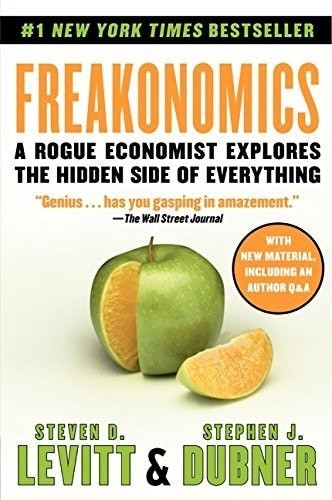
If you haven’t read this book by now, you’re seriously missing out. Reading this book is akin to pulling back the curtain and seeing the tubby puppeteer behind the Wizard of Oz for the first time. It’s a glimpse into the Matrix.
Freakonomics is written by Steven D. Levitt and Stephen J. Dubner, a couple of “rogue economists” who spend the entirety of the book challenging conventional wisdom with cold, hard economics and statistical analysis.
They ask stuff like, “How much do parents really affect how a kid turns out?” and, “Which is more dangerous: a swimming pool or a handgun?”
At the root of all of their investigations is one driving force: incentives. In other words, why do people really do what they do? It’s interesting overall, but, of course, it’s also useful from a marketing perspective.
The Malcom Gladwell Essentials: Outliers, The Tipping Point, and What the Dog Saw
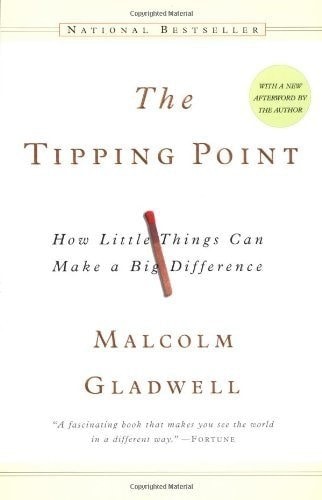
Malcom Gladwell is a prize-winning writer whose prose has appeared in major media outlets like The New Yorker and The Washington Post for decades. He’s an investigative journalist at heart, and his books often start with small questions about things with major impact.
For example, in The Tipping Point, Gladwell investigates that weird, special moment when something “goes viral,” starts an unstoppable cultural snowball. A relatively small “seed” can spark a global fashion trend. All of a sudden, a company can rise from the proverbial ashes and stick an iPhone in everyone’s hand. You get the idea.
In Outliers: The Story of Success, Gladwell examines the people who have utterly smashed expectations: those rare people who achieve such astonishing levels of success it’s almost confusing. What makes them tick? What’s different between then and the average Joe? It’s a study of all the factors that go into these prodigies and, hopefully, how we can be more like them.
If you want more of bird’s eye view of Gladwell’s stuff, check out What the Dog Saw, which compiles the best of his writing from the past few decades.
The Wealthy Barber by David Chilton
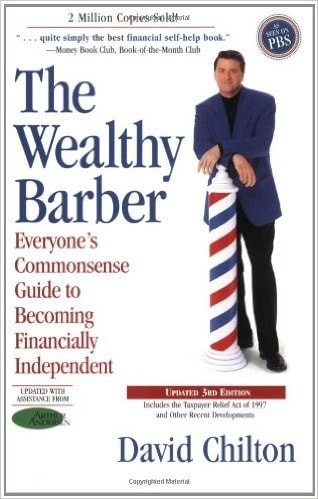
This is probably one of the better “financial self-help” books you’ll read (and believe me: they can be hard to find in the sea of crappy ones).
The idea in The Wealthy Barber is pretty simple but, in my view, also pretty revolutionary: financial independence is possible even if your only income source is an “average” salary.
It’s a funny book, and it uses a fictional Character named Roy to get most of its points across. But this book really is a gem. I mean, let’s face it: the average internet marketer isn’t going to make millions, so the concepts in this book go a long way toward achieving what gets a lot of us into this game in the first place: chasing a life of financial freedom.
Mindless Eating by Brian Wansink
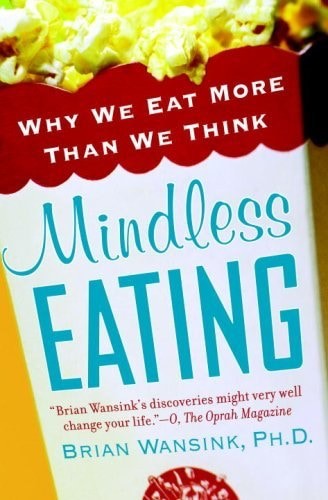
This is obviously not a marketing book, but it’s still an amazing book for anyone looking to improve their overall well-being and understand their own psychology.
Mindless Eating: Why We Eat More than We Think deep-dives into the psychology of eating. And let’s face it: there are more than a couple of us in this crowd that can eat a whole pizza by themselves. But why do we even do stuff like that? I mean, logically, it seems crazy right?
Brian Wansink has some pretty good answers to this and other questions, including: “Would you eat more if your dish was magically refilling itself?”; “Do you eat more or less when you’re eating ‘healthy’ food?”; and “Why do you really hate Brussels sprouts?” Awesome book if you’re a mindless eater.
Dotcom Secrets by Russell Brunson
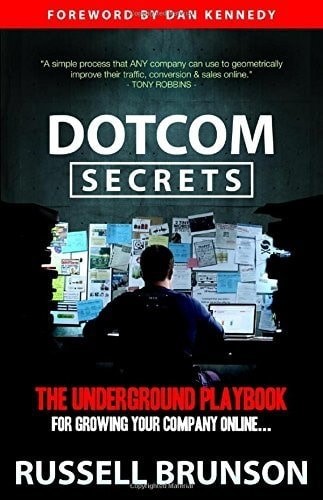
This much more in the Internet marketing wheelhouse. In particular, it’s a great pick for people looking to dive into sales funnels (and create funnels that actually make money).
Dotcom Secrets: The Underground Playbook for Growing Your Company Online goes through Brunson’s experience in online marketing and debunks a few key myths: that your problem isn’t with traffic or conversion; it’s with something much more fundamental (which we talk about in the podcast).
But there are a few great concepts here. Gael’s favorite is that using an attractive character and great storytelling are a much better way to teach people about something (and, eventually, to sell them something). It also does a great job of demonstrating the power of free stuff and how you can work that into your sales funnels.
Overall, this is one of those must-reads for anyone trying to make money with a website.
The Invisible Selling Machine by Ryan Deiss
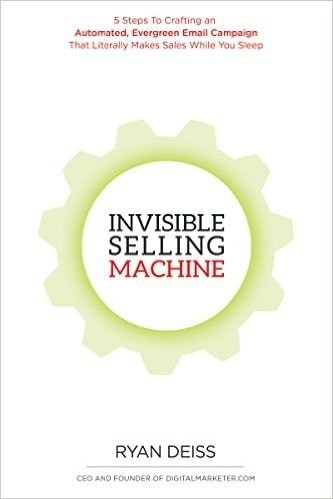
This is another book all about sales funnels, focusing on autoresponders and list segmentation. It was written by the captain of the ship over at Digital Marketer: Ryan Deiss.
The Invisible Selling Machine is a highly tactical book about autoresponders and email funnels. When I say “highly tactical,” I mean that you’ll get to see the exact emails Deiss uses in his multi-million-dollar businesses, and he encourages you to rip them off.
The big idea here is the idea of segmenting your list with free content. Deiss refers to this as “asking your audience to raise their hands” for things they’re interested in, so you can send them more emails.
Aside from the in-depth tactical material here, though, there’s a lot of good lessons about just how powerful an email list can really be. Highly recommended.
Delivering Happiness by Tony Hsieh
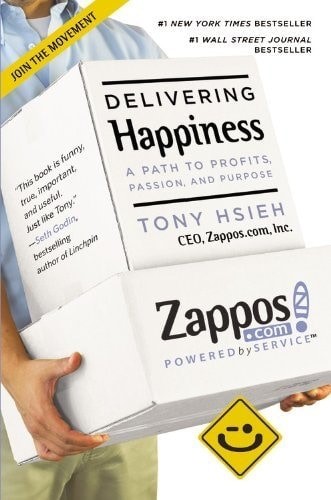
Some companies (cough Amazon cough) have recently been outted in the media for having work cultures so horrendous, so utterly abusive that workers routinely cry and the average length of employment is just a few months.
The counter-balance to this, of course, is the trend of startups around the world that place a strong emphasis on company culture.
Delivering Happiness: A Path to Profits, Passion & Purpose goes beyond even that. It’s a study on the value of focusing on employee happiness by Tony Hsieh, CEO of Zappos.
And some of the concepts here are pretty lofty. For example, Hsieh will pay new employees $2,000 to quit (really, read the book). He also makes happiness the #1 priority in his companies, and he provides plenty of science to back this up. At the end, though, the lesson is simply this: money should take a back seat to happiness, and even if it does, you can still rake in plenty of profits.
Influence by Robert Cialdini
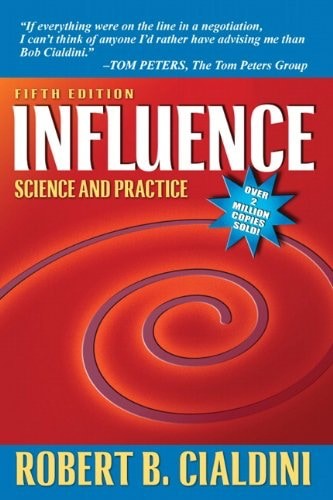
Want a superpower? Read this one.
In Influence: Science & Practice, Robert Cialdini—a master salesman, fundraiser and advertiser—takes a look at the art and science of compliance. In other words, he examines the factors that go into someone saying “yes” to something.
If nothing else, this book should give you lots of ideas that should become your arsenal of core marketing principles, like: the power of scarcity, social proof, reciprocation, consistency, and authority.
The best thing about this book, though, is probably its versatility. You can apply it to Internet marketing, of course, but you could just as easily use it for salesmanship or social interactions. Really interesting read and one of those “pillar” books you’ll keep on yourself forever.
Getting Things Done by David Allen
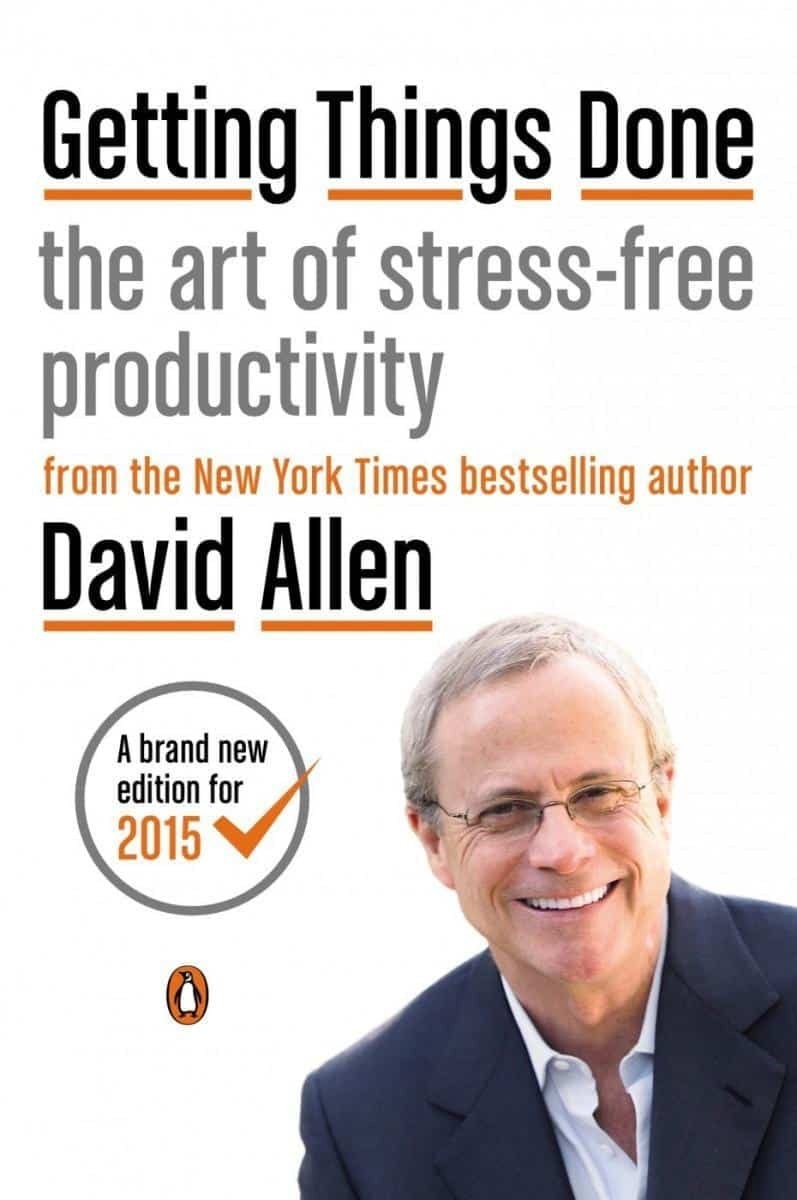
The crappy thing about most productivity books is that they usually push you to be productive at all costs. That’s no fun, and a lot of the tactics in those books, while they might make you more productive in the short-term, can burn you out in the long run.
Getting Things Done: The Art of Stress-Free Productivity is about being productive and happy. We’re lifestyle entrepreneurs, so that’s obviously an idea we can get behind.
But the concepts are great. This is stuff Allen’s used to teach C-level executives how to organize veritable mountains of work, and it’s tailor-made for the “chronically busy” person.
The one idea that makes the book worth it on its own, though, is the idea of filtering your tasks, which can help you in pretty much all areas of life: from your inbox to your business to parenting.
Productivity isn’t often talked about in online business circles, but it’s a mistake that’s made constantly (overcomplicating things and working on stuff that doesn’t move the needle). This book is (mostly) a one-stop remedy for that stuff.
That’s it!
Listen to the podcast, and then leave a review telling us your favorite books!
Full Transcript
Welcome to the Authority hacker podcast, the place to learn field tested, no BS tactics to grow hack your online business. And finally, live life on your own terms. Now, your hosts, Gael and Mark.
Gael: Hi guys, welcome to The Authority Hacker Podcast. I have Mark with me today. How’s it going today Mark?
Mark: Great, thanks.
Gael: Cool. Today we are actually talking about ourselves, which we don’t do that much in these podcasts. We kind of like relate to our experience, relate to the topic, but today we’re actually just going to talk about our favorite books and the things that shape the way we do things the most. I personally, have five books I’d like to recommend. How many do you have?
Mark: I have a little bit more than five, but I’ll pick my top five, unless we run short in time.
Gael: All right. And if you actually want to check out all these books there are going to be links to Amazon if you want to buy them for Kindle or Paperback or whatever, you can just go on authorotyhacker.com/21, and you’ll be able to find the show notes and there is going to be a link to all the books that we mentioned, as well as a really short summary to remind you which one is which, basically. And let’s just get started right now. Just pick a book and tell us about it.
Mark: All right. I’m going to start off with my favorite book, my favorite book I’ve ever read. I read it about ten years ago. It’s called “Adventure Capitalist”, not Venture Capitalist.
Gael: Ten years ago I didn’t speak English, by the way.
Mark: “Adventure Capitalist”.
Gael: “Adventure Capitalist”, ok.
Mark: Yeah. It’s by guy called Jim Rodgers. Now, he is quite old. He is about sixty something, but he basically grew up at some farm in Alabama and made his own way and ended up going to Wall Street. And he worked with, I think it was George Soros or something, on some big fond he established. Made ton of money and then retired when he was like thirty or something. He’s an investor, part-time but he spends a lot of time traveling. And now, he has kids and he basically spends a lot of his time raising his kids and stuff. I actually read another book about it. But this one specifically, actually it is his second travel book. And the book actually set the world record for the longest continues road journey around the world. So he literally, he bought a yellow Mercedes and literally drove around the entire world. I am not just talking like the shortest point, but he literally did the whole loop, like drove right around Africa, then he drove out through Asia and back through South Asia. He really drove around the world. And, it’s fascinating, because it is a travel book, because you hear about these cool experiences and like these driving through civil wars in Africa, or just all this crazy stuff that happens along the way, as you would expect in such a road trip. But it’s not that point that appeals to me. I like that, and it’s certainly entertaining to read but there is many travel books, many people have done similar-ish kind of things. But it’s the commentaries he gives about the countries, which I find so interesting. He approaches at all as an investor. And he talks about what’s working in this country and what’s not. So, for example, when he is in Turkey, he has a real problem getting some package delivered to him, which ends up being held for like nineteen days in customs, or something. Or when he is in Singapore, or Thailand I think it was, he is trying to cash a check and it takes a month to clear. So, all these like little things, little nuances that you wouldn’t normally like notice or think about when you think about analyzing countries that just- he’s really able to pick out all these things. And it’s even little things like how entrepreneurial people are and how willing people are to sort of serve the needs of people that want them.
And, there is a classic example that I experienced. When I think of all the time we spent in Asia, and just how entrepreneurial people are there, especially in China actually. Wherever people want to buy something, there will be plenty of sellers selling it. So whenever there is a thunderstorm, suddenly all these umbrella salesmen just appear out of nowhere. But I remember when I was in Ukraine, I was going to this football match and we had to walk for a long, long time, and there was just…there was nobody selling beer along this path and I thought -This was really odd. If this were in China, this wouldn’t be happening. So I mean, it’s not going to teach you how to make a great authority sight, it’s not like a tutorial book or anything, but it teaches you how to kind of like look at the world and view countries, compare countries, compare different parts and get a feel for how country really is by looking at things other than GDP or GDP per capital, or these sort of headline statistics, which don’t really tell you the real story. So, as someone who has traveled a lot, I find it super interesting and super insightful to, sort of, have this mentality approach when I go somewhere.
Gael: Probably develops your critical sense as well, which you need to do well anyway.
Mark: Yeah, definitely. And many of the books which are in my list are actually about developing critical thinking, so…
Gael: Yeah. I am actually looking at your list and my list and like all my books are like very online marketing related, and yours are not really. I guess it’s a good mix. That’s cool. That sounds… I could actually read that. I might actually grab it for Kindle. Ok, my first book is a book I’ve just finished, actually, and it’s called “Dotcom Secrets” by Russell Brunson. And that is the guy that created clickfunnels. And I am probably going to do a review of Clickfunnels, I actually like it quite a lot. I think it’s a great tool. But, what I like about this book is it’s not per se a business book, at least not at the end. It is actually his story of how he was a kid and he sign up to all these direct mail stuff and learned marketing by just like signing up to all these crap advertising that everyone is trying to avoid like plague. And then did the same, bought his first magazine and started doing that kind of stuff. And he starts with that, but then he actually gets a little bit technical and talks about how he runs his e-mail list and talks about how he actually builds his funnels in his business and so on. He opens up quite a lot, like more than you would expect for a ten dollar Kindle book. It’s more like the quality of training that you would find in a thousand dollar training. The level at which he opens up on the second half of the book. And there is one concept that I really liked actually, that relates directly to building authority sites. And he has this theory of the attractive character, which is kind of a personal thing, it’s kind of building a persona around yourself, and one thing that stroke me as part of this theory, that I think that we are really bad at, but that podcast may actually help us solving a little bit is that he explains that you shouldn’t teach people. You should be telling stories to them to teach them. So he talks about parables, like in the Bible, like when they actually tell stories to explain concepts. Well, he actually said that as soon as he started implementing that, especially when he went to conferences and then started including some demographics. So for example, at the beginning he was talking about his story, and he said that like most of like white mails that were like in their twenties to sign up for his products. But then he started talking about some of his clients who are mommy bloggers and then all the mums in the room started coming signing up at the end. And so it’s something I really want to work on, it’s kind of like this kind of story telling thing to sell stuff. And, I mean, it’s unethical but I think it’s pretty cool and I think that people that should read that are the people that are kind of interested in all these sales funnel stuff and customer lifetime value, and kind of like building an online business based on these sales funnels essentially. And especially for beginners, he actually explains everything from the start and it’s not all just traffic and make a funnel and build a sales page etc. there is a lot of like stories around…
Mark: So, can I just interject there. If you were new to online marketing, like you were just sort of like discovering it right now, would you say that this is a book to read first?
Gael: I would probably read it twice if I was brand new.
Mark: No. I mean, would this be like the first book you read, or would you need to have like a basis and understanding?
Gael: I think it’s a good first book, but as I said, I would probably read it twice. There is things that would probably get over your head and I don’t think you would, necessary be able to like deploy everything after reading it, but you’d have a more firm idea of the overall framework of things running. So yes, you can read it first, most likely you need to read it twice. And you’ll definitely need more training on how to do stuff because it’s a book. They don’t actually show you like click here, do that etc. But one thing that I actually took away, like one cool trick that I got from him is basically at some point he talks about the power of free. And it’s like he was like, if you sell something for 1 cent and then you offer it for free, and it’s just like, if you basically compare the sales between something that costs 1 cent and 99 cents and it’s like, like it’s maybe you sell 10 one cents for when you sell 1 99 cents. Right? And he was like, well if you bring the price down by 1 cent for each item so 98 cents and zero, then you get like a lot, a lot of takers for the zero for every 1 you get for the 98 cents. And basically, that is how he puts the front end of all his funnels, he creates a free plus shipping. And so, it’s a bit of war because he actually prints the books he sells, or whatever, and then he makes people pay for the shipping but he frames the front end product as free and he puts his upsells behind and basically- apparently I haven’t tried it but it probably it increases his sales by like 500 or 600%. That’s basically what took him from a five figure to a seven figure a year, apparently. So that’s one cool trick you get from the book and there is many more actually so I highly recommend it. Your turn.
Mark: Ok. The next one we going to talk about is “Freakonomics”. It is actually a series of books. The first one is called “Freakonomics”, The second one “Super Freakonomics”, and there is another one “Think Like a Freak”.
Gael: And the podcast is really, really good, too.
Mark: Yeah. I highly recommend that, as well. By Steven Levitt and Stephen Dubner. So, these guys have been around for quite a while now. I think it’s maybe fifteen years old or something “Freakonomics”, the original one. But, they’re economists, but they apply sort of game theory and economic logic to real world situations and it’s just like absolutely fascinating how these things have turn out. One of them, which is kind of a particular like headline grabbing like theory they put out there is actually safer to drink drive then it is to walk home when you’re drunk. Like, you look at statistics and the amount of people who die when they walk home when they’re drunk versus die when they drive home when they’re drunk is much more. So, by that logic, it’s safer, and less people…
Gael: For you maybe, not for others.
Mark: No, No… This is overall, total number of deaths so even taking into account the guy who drives home drunk and goes through four kids. Counting all of that, it’s still less people die if everyone drives home. Now, there are not presenting this as a suggestion for changing law or anything. All they’re doing is using data to give insight into situations which social norms dictate should be handled in a certain way. I don’t think it would be possible to change the law on this…
Gael: I mean, there are so many questions you would ask. It’s like, is it because people are so careful because they don’t want to be caught drunk driving and if you take the law away, then they going to drive more carelessly when they’re drunk and they going to kill more people. There is so many questions.
Mark: Yes and they actually, they address these kinds of secondary questions that come up in many of the topics they discuss quite regularly. And again, they’re not proposing this is what to do. All they’re doing is just saying: here is some interesting data and like look at what this actually shows. And so, there is some really like awesome stuff and it just teaches you again as another book, I guess, that’s a common theory, a common link in all, most of the books I’m going to recommend actually. They teach you like incredible amount of critical thinking and like really to analyze data very heavily, not to trust what your first instincts would be and to look at actual data, which actually, when you’re running an authority site is very useful because we have all had our theories about what would work and what wouldn’t work. But at the end of the day, it’s only data can really tell.
Gael: It’s something I actually said on the recap of 2015. It’s like we did these big keyword based blog posts, right? And the traffic is up, but the engagement is way down since we’ve started doing these. And that’s why we’re actually relaunching the podcast and doing all these other things, because essentially it’s one metric to look at traffic and it’s the one that Google Analytics give you, so it’s kind of in your face all the time. But when you look actually critically, what we did is we actually lost quite bit of engagement in 2015 and it’s that kind of critical sense that actually will help you to kind of steer the direction and also be really into go against what seams of use initially. So, I think it’s good. I really love “Freakonomics” and yeah, the podcast is really amazing to listen to it all the time. Anything else on them?
Mark: I mean, I can talk for hours about this but…
Gael: No. No. No…[laugh] I think it’s enough. Ok. So, my second book is going to be another online marketing book and after that I’m kind of going to steer away from online marketing, but these two, they are really good actually, and from two competitors of ours actually, and really their Kindle books are really good and this one is “The Invisible Selling Machine” by Ryan Deiss. Ryan Deiss is the guy who created digitalmarketer.com and he basically, same as “Dotcom Secrets” starts with the story about how he had a big tax bill and didn’t have the money to pay for it, so he took his e-mail list and tried to figure it out to actually pay for it and within a few days, he made millions of dollars. That sounds a little too good to be true, there is where my critical sense kind of like tickles me, but there is stuff he teaches after about email marketing as basically he is opening of the way he runs e-mail marketing. And one main cool thing that helped us a lot is the idea of segmenting your email list with free content. So, people give you their email, but you don’t know much about them when they give you their e-mail. You know their name, maybe, you know their email address, and you know what they opted in for. But people are not unidimensional. If you guys opted in for an SEO thing, you might still be interested in something we do about Facebook ads, but I have no idea at this point. What Ryan does, he actually recommends that you take your e-mail list and offer more free stuff to them and you kind of tag them to just based on where they actually go and download in terms of lead magnet or even check in terms of blog post. You start learning more about them and putting relevant offers in front of them, so an example would be: there is going to be a guest posting product coming up soon for Authority Hacker. And there is a good chance that I would probably put something in front, I would probably put, “Hey download my guest posting templates to learn how to outreach properly for guest posting”. And then I would follow that backup directly with sell speech for the guest posting product and keep pushing the app sells etc. And so, if you are building any kind of email list, there is a really, really good book to check out. I mean, they have a product that costs like 2000 dollars, but really all the principals for this 2000 dollar product are in this Kindle book that you can buy for 10 dollars. So it’s really good money spent in terms of value for training. And one cool thing I learned from this book is and something that I would probably not have that naturally is that it’s ok to e-mail 3, 4 or 5 times about the same offer, with a slightly different angle. And really, when you email your list it’s like 15-25% of people opening their e-mail. So, most people don’t open the email, don’t even click the links and so…Yeah, they really are quite aggressive on promoting offers multiple times when you qualify for one and we’ve done that with great success actually. Lot of times you know the sell comes from e-mails 3, 4 ,5, 6 or whatever. It made us a lot more aggressive and increased our revenue from e-mail quite a lot, as well. I mean, you have read it as well, I don’t know what you think.
Mark: Yeah, I think it is fantastic book, It’s probably one of the best I’ve read in internet marketing space. And yeah, as you said, we base so much of what we do on that. It really changed a lot in our businesses.
Gael: Yeah. It’s worth it for a 10$ Kindle book is pretty good. Your turn.
Mark: Ok, so, my next one is- it’s actually again as the number of books by the same guy, Malcolm Gladwell, really very, very popular author and lot of people have read these books. My top three are “The Tipping Point”, “Outliers”, and “What the Dog Saw”. They are…he’s another one of these- he’s not an economist, he’s more like a sociologist maybe, but again he uses a lot of like data points and human behavior to sort of analyze how groups of people behave in certain circumstances and how…Not just groups, but how individuals behave as well, actually in certain circumstances and his books are basic collection of short stories, or short essays, I am not quite sure about specific situations. Sort of like “Freakonomics” actually. So it’s quite easy to read, and like for short burst of time, which is how, I guess, I like to read. My kind of style. But one of the key points, key takeaways and the tipping point was this concept of a… In New York City, there was they had a real problem with graffiti and like rundown neighborhoods and all this kind of stuff. And what they actually found is that when you had like one broken window in the street, the amount of graffiti and the amount of like other damage increased exponentially. It’s because of this concept of the tipping point like, ok, this street has been a little bit wrecked so therefore it’s ok to completely wreck it. That’s kind of like the mentality going on here. So, when we analyzed this, there’s a lot of similar situations in life that we can attribute this to.
And there is another big example of, I think it’s the hush puppies, type of shoe, I believe, which is one of the other big examples like about how something gets popular. It’s like when it reaches the certain critical mass, it just explodes. Now, from a personal point of view, I always kind of think back to this, like when we are launching new web site or starting new business and it’s like, it needs to reach that critical mass, that tipping point before it gains legitimacy in my eyes and it’s like an established thing, if you will. But because I’m aware of the only difference between success and failure is which side of the tipping point you are on, you can actually be very close, much closer than you think to getting there and still not be. So, it’s just I guess for me like I am always a lot more…I try to distance myself emotionally from where I am in a project, but not kind of become too emotionally involved in something. And I like to look at it from a purely data driven point of view. So, like a classic example is we are doing these projects in like sort of August, September, and I was doing really quite a lot of work to make this happen and Gail was like: Oh, well this is always the time. We should do this instead.
Gael: Like I always do.
Mark: And I was like, in the past, many times when we were like: Oh fuck off! But in this case I was like: Yeah. Yeah, you are probably right. Like straight away, without even thinking about it. Because it’s like, just because I had that kind of data kind of driven mindset. And I was thinking kind of not about myself involved in it, but like from outside perspective and that really helps. There is also a lot of really crazy stories in there about how things work. Like have you ever wondered why there is only really one brand of ketchup that is available around the world. Everyone eats Heinz. Yet , there is like dozens of kinds of mayonnaise. And there is actually like a scientific reason for that, to do with like different taste tests and all this kind of stuff, I think that’s in “What the Dog Saw”. So, yeah, just another fascinating book for this kind of…
Gael: It’s a bunch of quick interesting facts, essentially.
Mark: Kind of yeah. But again, it’s another one of these things for like developing the way you think and perceive the world around you .
Gael: Cool. Ok. I could check that out as well actually. My next one is “Delivering Happiness” by Tony Hsieh. I’m not sure if I say his name correctly, but he is the founder, not the founder but he’s been the iconic CEO of Zappos, the shoe company in US and basically he’s started his first company even as a kid to being acquired by Amazon for, I think it was like 1.1 billion dollars, a lot of money. And it’s a pretty cool way of thinking of company etc, it’s pretty how to put in practice what you have learned in a book, but it’s kind of a feel good entrepreneurship book, I would say. And I just like the idea of like becoming friends with your customers and basically what the book really says is: the product that you’re selling is commodity. What you need to deliver to your customers is to make them feel good about their experience. And it’s very much something I try to apply to Authority Hacker, I must say I wanted to do that as an agency before, and we didn’t do very good at that. We could have done much better job, but on Authority Hacker I find it much easier to do, and I can see a lot of people just being happy to be there. And that’s part of because of the way I am trying to like serve them. I hope…I like to believe at least. I think like anyone that starts selling their own product and that has to deal with customer service and talking to their customers regularly, should definitely read this book. Despite the fact that it’s a story, there is a lot of like culture in Zappos where they go above and beyond on the customer service.
For example, one of the principles they have is that when you talk to your customer when they are doing an order or when there is something like that coming, actually they try to figure out what’s wrong with the customer in their life and talk about that and we are actually able to that a little bit when we sell Authority Hacker Pros, like people go on chat and I’m actually able to figure out about them etc. I talk to them and eventually they don’t just sign up but the chances of staying a member and sticking around and so on and actually I talk to a lot of members that join us as well. I just call them up and stuff. I mean our retention rate is amazing on Authority Hacker Pro. It’s like 75% of the people that sign up never unsubscribed from the point we started the membership, so it’s pretty good and yeah, a lot of the principles that we apply in terms of communicating with people on the Facebook group as well are coming from this book. So it’s a story so I’m not going to spoil the story but basically Zappos got really big just because they offer people to send them multiple sizes and free returns and may have been the first one offering free return and so on. So that is a pretty cool book if you going to sell anything . I don’t know if you’ve read it but…
Mark: No. I actually started reading it back in the office and we were looking at like company culture and all that, but I kind of got this way that it was like: yeah first you need to make a shit load of money and then you need to implement this cool culture.
Gael: Is this like when you sell your services, it’s hard I would say.
Mark: Yeah.
Gael: When you sell your time as a freelancer, basically as a consultancy or a freelancer, it’s pretty hard because it’s already the product. So it’s like, well, this is expected, so, people don’t value it as much but on Authority Hacker Pro is different, like I sell videos of us and a little bit of webinar time, but everything else is extra and seen as extra value.
Mark: There is another book similar to that I read, called “Secret Service”, not about like presidential bodyguard, but about like delivering like ridiculously good customer service and like in hair salon of all places, that was particularly interesting. So that’s also one to check out.
Gael: Yeah. I definitely find this applying a lot more to what we are doing now then when we had an agency.
Mark: Yeah I agree product based businesses are just a completely different animal for customer services.
Gael: Yeah, it’s like people actually value the time you give them out of the blue whereas they say that that as consultant people, they would just expect it.
Mark: Yeah.
Gael: Highly recommended! Check it out!
Mark: Ok. My next one is called “The Wealthy Barber”. It’s by David Chilton. I can’t remember who recommended it to me. It was one of my friends, I think did like end of year post one year or something like that and it was in there. So, whoever you are, thanks for recommending that. But, yeah, fascinating book. It tries to teach you about money and about saving money, about investing and about basically all the things you have to do when you are young in order to be rich when you are old. But it’s not like a textbook: do this, do this… It’s told in a form of a story. And it’s basically about these two couples, or like one and a half couples, who go to this barber to get a haircut once a month and the barber turns out to be super rich. And he is teaching them all the tricks as they go, but it’s kind of like they’re learning but they are not learning kind of thing. Basically it’s a good way of teaching people something which is not quite dry.
Gael: Stories?
Mark: Yeah. But, some of the principles in there are fantastic. One of the first things he is teaching you is this concept of compound interest. Like when you start making interest on some savings, it may not seem much to earn 6-7% a year but actually when you start compounding that over 30 years, it really starts to add up, like seriously significantly. And there is other things, like just setting up little things so 10% of whatever you make should always get put into a savings account immediately, before anything else, and tips and tricks like this. There is also a big section on buying your first house and property investing and this kind of stuff which is not for everyone. When I started reading it, I wasn’t even thinking about that but I am actually looking at doing something like that in not too distant future now. So, it’s been really helpful from that point of view, just giving, I guess like a seasoned and insightful guidance and to how to manage your money and how to plan things.
Gael: I need to read that.
Mark: I mean, I’ve never been like an idiot. I’ve never had credit card debt or anything like that, so I’ve never had problems like that, but I never tended to save much money at all really until I started reading this book. So… yeah..
Gael: I need to read that book I think.
Mark: Yeah It’s awesome.
Gael: It’s actually like, it’s the one thing that I haven’t figure out in my life, it’s like personal finance at this point. I’m just worrying about making more money at this point, but…
Mark: I’ll tell you for free, it does not advise you to keep a 100% of your money for current bank account.
Gael: Really? That sounded like a good idea. It’s just something I just didn’t figure out in my life, to be honest. But I will check it out now. I am actually buying this book just after this.
Mark: It’s not super complicated either.
Gael: No. I think it’s just a matter of sitting down and actually thinking about it. But anyway, let’s just jump to my next book, which is going to be a pretty classic one for marketing, “Influence” by Robert Cialdini. Robert Cialdini essentially spent, I think, over 10 years studying the principles of influence. And he hanged out with sells people, with politicians, with anyone that is convincing you for a job, and tried to break down what exactly what they were doing, what tricks they were using essentially. And the book is basically broken down per principle of influence, there is seven, don’t ask me to tell all of them, but I’m going to talk about a few of them and then basically he talks about how he discovered each little subtility of it through one of his experiment or one of his contact and so one. Really, this book puts a lot of core marketing principles in my head. Like help me understand basics like scarcity and we have podcast in scarcity coming up soon and you understand what it does. It’s like people actually want what they can’t buy and they give you examples of that, and they tell you how second hand car salesmen are using this to trick people into buying cars they don’t , they probably don’t want. He talks about social proof and how politicians use that a lot to actually win elections. So, there is a lot of cool base core principles, and anyone that is going to do any kind of marketing, I think should read that. If you’re a student and you’re doing marketing, this is actually better than all the marketing classes I’ve taken, together. This one book. So yeah, it’s not necessary the most fun read like the facts and the stories, they’re interesting but they’re not always super, super fun. But you’ll learn a ton. And it’s almost like when we start doing a sales page or something, I go back to these principles of influence and I just like go to the check list and like: oh did I use this-check, did I use this-check, etc. So it’s definitely a golden standard and I’m going to give you one cool trick that I learnt from it, That I think it’s cool and the experiment was that people were queuing to do photocopies like with the Xerox photocopies, and there was a queue of five, six people and then they sent a guy to try and get a copy and get in front of the queue. And, so, if the guy went and said: can I go in front of you? Something like four out of five people would say no. And then when the guy said: Hey, can I get in front of you because I need to do some copies? Then there is 81% more people that said yes or something. And that’s just for using the word because and giving a token of reason. So whenever you ask for something always give a token of reason, even if it’s a bullshit one it actually increases the yes by a lot. So, that’s the kind of cool tricks you going to learn in this book. I think it’s a good one.
Mark: I’ve read most like self help books out there, well, most of the main ones, but this is actually the one, like big one I’ve never read. So, I’ll have to check that out at some point.
Gael: I think we are the ones that are going to buy the most books out of this podcast, I think.
Mark: [laugh] Well, make sure you buy it through our affiliate links. Ok. My last one is one I read very recently. It’s called “Mindless Eating” and I can actually remember that…I’m just Googling that, the author’s name. It’s by Brian Wansink. He is basically this like food scientist or nutritionist. Food scientist is a better way, and he works at the university in the US. And they actually have this fake restaurant. Well it’s a real restaurant, but people go there to eat and they don’t know that they are taking part in scientific experiments all the time. So, for example, one day they will give half of the restaurant one size of plate and the other half slightly smaller size of plate. And then, every table has like a set of scales built into where the plates are, like which is completely hidden and they measure how much food is left over in the end of each like sort of set of people. And it’s all done like very scientifically. There is lots of like university students working on it and even like big food companies sometimes pay to have studies done. But they find like fascinating things. So, if you a smaller plate, you eat on average like 28% less food throughout the meal. And this is when the same amount of food is like given to you. And then, there is another one where they actually have bottomless soup bowls. So they have like different people are given different bowls and they look the same, except one of them is a just normal bowl and you eat the soup- it’s gone. The other one has like a small hose at the bottom of it and it keeps refilling so you can never finish it, and those people ate like 60% more soup then the people who didn’t. So, this is just two of like 500 different examples of this kind of thing. But it just goes to show you like how much your subconscious really has control of many of the actions you do and how little you are actually aware of some of the actions you take, specifically around food, which is something which, is like a real big issue in the US, especially right now, like the obesity epidemic and also quite interesting for me to know these things running a health site. So, yeah, I thought it’s again very interesting. That’s one of these things that teaches you more about how you operate in the world, like things that you don’t really think about or…
Gael: I think it can inspire you some twisted on line marketing stuff as well, to be honest.
Mark: Oh, for sure, yeah.
Gael: Yeah. I think some stuff’s going to spark out of that. Cool. Anything else about this book?
Mark: No.
Gael: Ok. So, my last one is going to be…and this is the last one of the list, I think. Right?
Mark: Yep. I mean, we had a lot more, so we maybe do part two of this in the future, at some point.
Gael: Yeah. I think ten books for people is enough. For now. So my last one is a productivity book called “Getting Things Done”, by David Allen. And David Allen is like a productivity coach and he teaches super high level executives to be more productive and claim their time back. They’re kind of people that is always on their e-mails and they’re always saying they’re busy and stuff. He helps people getting more organized and I mean, especially running bigger sites with a lot of campaigns running in parallel and stuff. I find my list of tasks to be very, very long now and Mark can testify, I used to be terrible at organizing anything.
Mark: Come on! I mean, terrible is too nice of a word.
Gael: You’d literally send me an e-mail and there is a zero chance you’d get a reply. You don’t get a reply every time when you email me now, but that’s because I get way more emails now. But it’s like…yeah, that was crazy. Now, this book is probably one of the main reasons why I am a little bit more organized. So, if you ever say that you’re busy more than five times every day, then you probably should check it out. And, I’m just going to wrap it up and there is a whole system getting things done. There is a whole system, but there is one little thing I’m going to teach you about that system and that’s the inbox system. And the idea is that we always keep what we have to do in our heads. We always remember what we have to do, or we think we do and when we forget, it falls of and you don’t follow back and that’s how you become an unreliable person. And, so there is this concept of inbox to do list, where you just write down what you have to do, whenever it come your way and you just write it down. And then you can forget about it. And then, once a day or once a week you actually go back to this inbox and actually organize these tasks and you put them in projects, you put them in tasks, etc. But most importantly, you say when you are going to get them done, you put a deadline on it. And if you use any modern task service, like Asana, like to do list, that kind of stuff, then these thing are actually going to remind you when you are due to do stuff. And so, they act a little bit like your personal day planner because you start having all these deadlines kick in, and you have to do is wake up and go through the list of things you have to actually finish today and get them done. And then, you become an actually reliable person. So that is like one little thought of that whole system, but I think just that can change your life and change life of everyone that works with you. So, that’s how I’m going to close on this. “Getting Things Done” by David Allen is pretty good. If you want to check links to all these books go on authorityhacker.com/21 and there is going to be a link to every single book with a short summary, so you know which one is which. And we hope that you’ll pick up one or two these and get a bit wiser from these. Guys, thank you for listening. Have a good day! And we’ll see you guys at the next episode.
Thanks for listening to the Authority Hacker podcast. If you enjoyed this show, don’t forget to rate us on iTunes, and send us a screenshot on authorityhacker.com/bonus to claim your free, premium Authority Hacker training.





